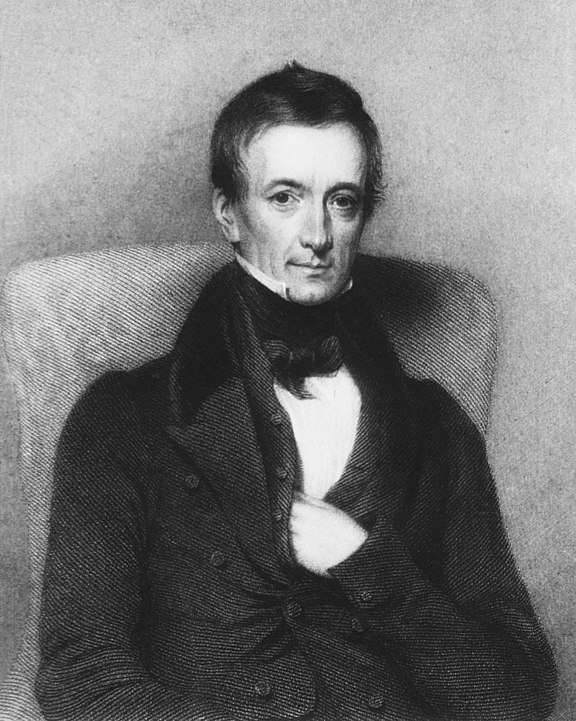In the world of writers, editors, and other wordsmiths and logophiles, January 18 is celebrated (lauded, observed, proclaimed) as Thesaurus Day. Though it’s a fairly recent addition to the always growing list of unofficial holidays, it marks something that happened more than 240 years ago: the birth (delivery, naissance, nativity) of Peter Mark Roget, the man without whose work thousands of writers over the last century would have torn out their hair trying to remember that one word … that one that means the same as this word but is different.
Sadly, the catalyst (impetus, motivator, stimulant) of his creation was likely tragedy and mental illness.
Roget was born in London in 1779 into a family of privilege (advantage, entitlement, opportunity). Wealth and status, however, are meaningless in the face of infectious microbes: When Roget was only four years old, his father (dad, papa, progenitor) died of pulmonary tuberculosis. His mother never recovered from the tragedy (catastrophe, disaster, misfortune), suffering paranoia and anxiety for the rest of her life.
We may never know to what extent Roget’s personal (individual, particular, peculiar) mental health problems were based in his genetics and how much was a result of being raised by a “difficult” mother. Regardless, he found himself in a constant battle (combat, struggle, war) against depression, and he also exhibited signs of what today might be classified as obsessive-compulsive disorder. One way this OCD manifested was that, from the age of eight, one of his coping mechanisms was to create (build, construct, forge) lists — to classify and bring order to the things around him.
Outwardly, he became a successful and popular member of society (civilization, community, culture). He established a career as a physician (doctor, healer, sawbones) after graduating from the University of Edinburgh, but he was a true polymath, studying philology, mathematics, optics, and other disciplines. He even invented a type of slide rule for calculating (determining, measuring, reckoning) the roots and powers of numbers, the design of which remained in use until the creation of the electric calculator.

(Thomas Pettigrew, Public Domain via Wikimedia Commons)
But always he had his lists, and as he matured (aged, developed, ripened), the lists became more focused and useful. He had begun grouping words by the disciplines that used them, originally to benefit his own writings (belles-lettres, compositions, prose). But when he was 26 years old, he began collecting (assembling, collating, compiling) and arranging (and continually expanding) his lists with an eye toward publishing a “reverse dictionary.” The basic (essential, fundamental, key) idea was a book to help writers who knew the meaning of the word they wanted but couldn’t come up with the word itself.
Though he did finish a first draft, that early publishing goal wasn’t reached (achieved, attained, realized). He was, after all, a very busy (active, engaged, occupied) man: In addition to his work with his patients, he conducted lecture tours throughout Europe. He had become a Fellow of the Royal Society in 1815 and became its secretary in 1827, a position (job, function, occupation) he held for 41 years.
His magnum opus would have to wait (delay, linger, stand by) until his retirement.
And it did: Roget retired from his practice in 1840 and from science completely in 1848, and he returned to (came back to, circled back on, revisited) thoughts of publishing, but now, at the age of 69, he had the leisure time to finish. He called his new reference book (opus, tome, volume) a thesaurus, a Latin word meaning “treasury” or “hoard.”
He didn’t, however, coin the word (expression, lexeme, term). As far back as the 1590s, early English dictionary and glossary compilers had used the word thesaurarie to describe (characterize, label, name) their works. That word in turn comes from thesaurus verborum — Latin for “treasury of words” — which was long used for literary and reference collections in various languages (dialects, idioms, tongues), but mostly Latin.
So neither the name nor the concept of a collection (assemblage, compilation, stockpile) of synonyms and antonyms was novel, but Roget’s lifelong obsession made for a much larger and more exhaustive reference work. It was published for the first (earliest, initial, inaugural) time in 1852 as Thesaurus of English Words and Phrases Classified and Arranged so as to Facilitate the Expression of Ideas and Assist in Literary Composition. They liked long (expansive, protracted, sesquipedalian) titles back then.
It wasn’t, however, organized as it is today (at present, currently, now). Borrowing Carl Linnaeus’s principles of zoological classification and applying them to language, Roget categorized and then subdivided (apportioned, partitioned, separated) his entries under six broad classes:
- Abstract Relations
- Space
- Matter
- Intellect
- Volition
- Affections
Roget still had in mind the concept of a “reverse dictionary,” and so to use it, a writer had to decide what kind of word they needed first, and then they could start the search (hunt, probe, quest). Shortly before publication, though, Roget decided to add an alphabetical (abecedarian, A to Z, consecutive) index, so it could be used to search directly for synonyms and antonyms.
Roget tinkered with and expanded the book until his death (demise, expiration, passing on) in 1869. And he had that opportunity because the book was an immediate hit (success, triumph, victory), so much so that the printers had a difficult time keeping up with demand.
After Peter Mark Roget’s death, his son John Lewis Roget and then his grandson Samuel Romilly Roget took the thesaurus into the future, expanding it even further and reorganizing it into the modern (contemporary, current, up-to-date) Roget’s Thesaurus.
Today, Roget’s is as synonymous with thesaurus as Webster’s is with dictionary. Since its first publication in 1852, it has never been out of print. And, at least to us word nerds, that’s something to celebrate.
And if you’ve grown tired of the parenthetical lists of synonyms, take heart: This sentence contains the last (concluding, final, ultimate) one.
How does one celebrate Thesaurus Day? Here are a few ideas you can consider:
- Crack open a thesaurus or dictionary and learn a new word. See if you can work it into conversations and emails.
- Write about your favorite word. If you don’t have a favorite word, today is a great day to hunt one down.
- Make an effort for the day to replace the common words you use most often (like yes, leave, and funny) with less common ones (such as indubitably, absquatulate, and gelogenic).
- Subscribe or send a donation to your favorite online dictionary, thesaurus, word blogger, or language podcast, in honor of Thesaurus Day.
Become a Saturday Evening Post member and enjoy unlimited access. Subscribe now



